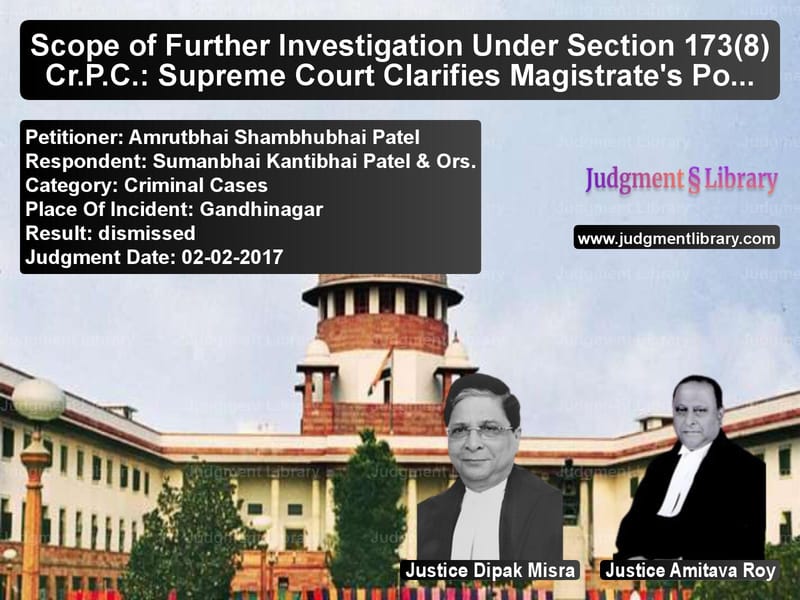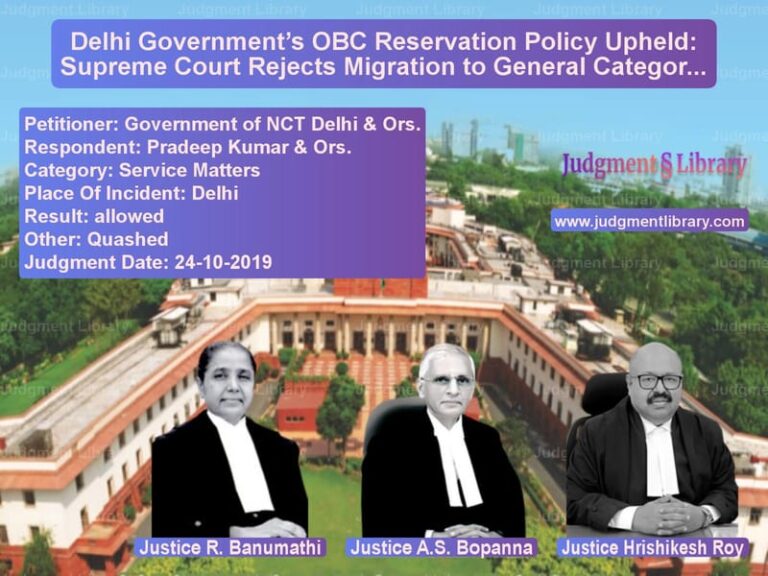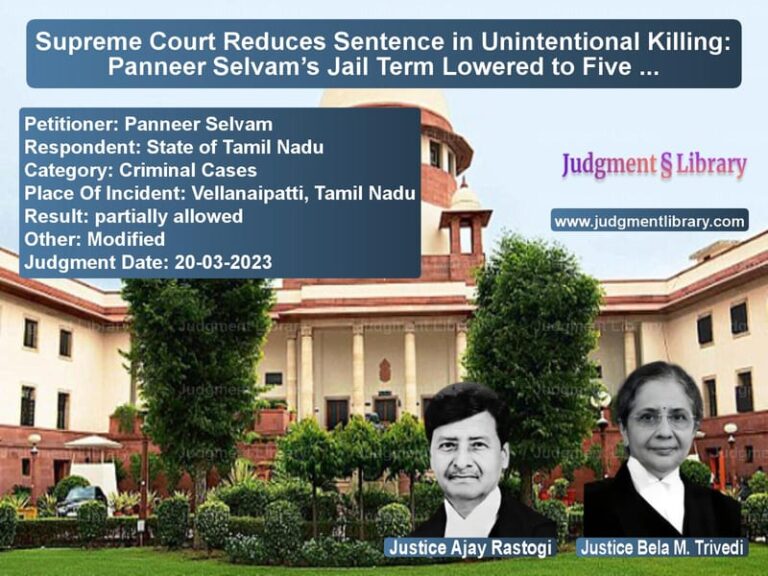Scope of Further Investigation Under Section 173(8) Cr.P.C.: Supreme Court Clarifies Magistrate’s Powers
Introduction
The case of Amrutbhai Shambhubhai Patel v. Sumanbhai Kantibhai Patel & Ors. is a landmark judgment that addresses the critical issue of further investigation under Section 173(8) of the Code of Criminal Procedure (Cr.P.C.). The case primarily examined whether a Magistrate has the power to order further investigation after taking cognizance of an offense and whether such an order can be made at the instance of the complainant. The Supreme Court’s decision in this matter has far-reaching implications for criminal law, particularly concerning the autonomy of investigative agencies and the limitations of judicial intervention in criminal proceedings.
Background of the Case
The dispute arose from a property-related matter in Gandhinagar, Gujarat, where the petitioner, Amrutbhai Shambhubhai Patel, alleged forgery and fraudulent transactions against the respondent, Sumanbhai Kantibhai Patel & Ors. The petitioner filed an FIR against the respondents under several sections of the Indian Penal Code (IPC), including forgery and criminal conspiracy. Following an investigation, the police filed a charge sheet, and the Trial Court took cognizance of the matter.
After the commencement of the trial, the petitioner approached the Trial Court, seeking further investigation into certain aspects of the case, particularly the alleged fabrication of documents. The Magistrate allowed further investigation, which was subsequently challenged before the High Court of Gujarat.
Legal Questions Before the Supreme Court
The case raised the following critical legal questions:
- Can a Magistrate order further investigation under Section 173(8) Cr.P.C. after taking cognizance of an offense?
- Does the power to conduct further investigation rest exclusively with the investigating agency?
- Can the complainant seek further investigation even after the charge sheet has been filed?
- What is the distinction between further investigation and re-investigation?
Petitioner’s Arguments
The petitioner contended that:
- The initial investigation was incomplete, and crucial evidence was not considered.
- The Magistrate has inherent powers to order further investigation in the interest of justice.
- The case involved serious allegations of forgery, requiring additional scrutiny.
- The denial of further investigation would lead to a miscarriage of justice.
Respondents’ Arguments
The respondents opposed the plea, arguing that:
- The investigating agency had already completed its probe and filed a charge sheet.
- Once the Magistrate takes cognizance, further investigation is within the domain of the police, not the judiciary.
- The petitioner was attempting to prolong the trial by repeatedly seeking further investigation.
- The High Court rightly intervened to prevent unnecessary delays.
High Court’s Decision
The Gujarat High Court ruled against the petitioner, stating that:
- The Magistrate erred in ordering further investigation after taking cognizance.
- The investigating agency alone has the power to decide on further investigation.
- Allowing further investigation would set a dangerous precedent where complainants could indefinitely delay trials.
Aggrieved by the High Court’s ruling, the petitioner approached the Supreme Court.
Supreme Court’s Judgment
The Supreme Court upheld the Gujarat High Court’s decision, ruling that:
- Under Section 173(8) Cr.P.C., further investigation is the prerogative of the investigating agency.
- The Magistrate does not have the power to order further investigation suo motu after taking cognizance.
- Once cognizance is taken, the only option available is for the investigating agency to seek the court’s permission to conduct further investigation.
- The power of further investigation is different from re-investigation, which is prohibited unless specifically ordered by higher courts.
Key Legal Takeaways
- Magistrates Have Limited Authority in Further Investigation: They cannot direct further investigation once cognizance is taken.
- Investigative Agencies Retain Autonomy: Only police or investigating agencies can initiate further investigation.
- Distinction Between Further Investigation and Re-investigation: Further investigation supplements an existing probe, while re-investigation starts afresh.
Impact of the Judgment
This ruling has significant implications for criminal law, particularly in ensuring the separation of powers between the judiciary and investigating agencies. It clarifies that:
- Complainants cannot misuse the provision to delay trials.
- Magistrates must exercise caution while dealing with further investigation requests.
- Investigating agencies must act diligently before filing charge sheets to avoid post-cognizance complications.
Conclusion
The Supreme Court’s decision in Amrutbhai Shambhubhai Patel v. Sumanbhai Kantibhai Patel & Ors. reinforces the principle that judicial oversight should not extend into the investigative domain beyond prescribed limits. By limiting the Magistrate’s power in ordering further investigations, the judgment upholds the autonomy of investigative agencies and ensures timely completion of trials.
Don’t miss out on the full details! Download the complete judgment in PDF format below and gain valuable insights instantly!
Download Judgment: Amrutbhai Shambhubha vs Sumanbhai Kantibhai Supreme Court of India Judgment Dated 02-02-2017.pdf
Direct Downlaod Judgment: Direct downlaod this Judgment
See all petitions in Fraud and Forgery
See all petitions in Bail and Anticipatory Bail
See all petitions in Damages and Compensation
See all petitions in Judgment by Dipak Misra
See all petitions in Judgment by Amitava Roy
See all petitions in dismissed
See all petitions in supreme court of India judgments February 2017
See all petitions in 2017 judgments
See all posts in Criminal Cases Category
See all allowed petitions in Criminal Cases Category
See all Dismissed petitions in Criminal Cases Category
See all partially allowed petitions in Criminal Cases Category







